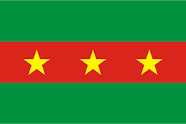Language/Ewe/Vocabulary/Animals
Hi Ewe learners! 😊
In this lesson, we will learn the names of some common animals in Ewe language. Learning animal vocabulary is essential if you wish to describe them, talk about them or just have a conversation about animals. Knowledge of animal names is also vital if you intend to go on a wildlife safari, visit a zoo or explore the diversity of fauna in Ewe-speaking regions of the world.
To navigate easily through this lesson, click on the table of contents below:
Consider broadening your understanding by checking out these related lessons: Say Hello and Greetings in Ewe, Geography, Fruits & Count to 10.
Domestic Animals[edit | edit source]
Domestic animals are those that are kept by humans for various purposes such as food, milk, and other by-products. These animals can typically be found in or around human settlements.
| Ewe | Pronunciation | English |
|---|---|---|
| ƒeke | /feke/ | Chicken |
| nyɔnu | /ɲɔnu/ | Cow |
| ɣekɛ | /ɣeke/ | Goat |
| nukpa | /nukpa/ | Horse |
| anyigba | /aɲigba/ | Sheep |
Dialogue:
- Person 1: Kofi, wo be tu ƒeke? (Kofi, do you have a chicken?)
- Person 2: Ɛ, mi hunu ƒeke. (Yes, I have a chicken.)
Wild Animals[edit | edit source]
Wild animals are generally found in the wilderness or natural habitats, away from cities and towns. These animals are not domesticated and are usually more aggressive and dangerous than domestic animals.
| Ewe | Pronunciation | English |
|---|---|---|
| ɣuosogɔ | /ɣuosogɔ/ | Elephant |
| ɣla | /ɣla/ | Lion |
| wu | /wu/ | Hyena |
| agba | /aɡba/ | Monkey |
| gbe | /ɡbe/ | Snake |
Did you know that elephants are the largest animals on land? They can grow up to 4 meters tall and weigh up 9000 kgs! 🐘
Dialogue:
- Person 1: Mawuli, wo be tu ɣla? (Mawuli, have you seen a lion?)
- Person 2: Aɣɔ. Tsoɖe mia, mi tɔ ɣla. (No. But yesterday, I saw a lion.)
Birds[edit | edit source]
Birds are versatile animals that can be found all over the world. They come in various sizes and colors, and they play an essential role in the ecosystem, from pollination to seed dispersal.
| Ewe | Pronunciation | English |
|---|---|---|
| dzi | /dʒi/ | Bird |
| kpalime | /kpalime/ | Vulture |
| kuodzi | /kuodʒi/ | Parrot |
| dzakpaa | /dʒakpaː/ | Pigeon |
| dziruru | /dʒiruru/ | Sparrow |
Did you know that the Vulture is an essential bird in the ecosystem? They are scavengers and help clean the environment by consuming the carcasses of dead animals. �
Dialogue:
- Person 1: Afi, wo be tu kuodzi? (Afi, have you seen a parrot?)
- Person 2: Aɣɔ. Dzidziƒò nya me lɔ. (No. But I heard a parrot singing.)
Aquatic Animals[edit | edit source]
Aquatic animals are those who live in water. They can be found in oceans, lakes, and rivers worldwide. Aquatic animals play a crucial role in their ecosystems, from oxygenating water to serving as food for humans.
| Ewe | Pronunciation | English |
|---|---|---|
| do | /do/ | Fish |
| bɔɣu | /boɣu/ | Crab |
| ɖe | /ɖe/ | Seahorse |
| abɔ | /abo/ | Dolphin |
| ataa | /ataː/ | Octopus |
Did you know that the octopus is a highly intelligent animal? They can open jars, solve puzzles and are known for their ability to camouflage themselves. 🐙
Dialogue:
- Person 1: Selasi, wo be tu do? (Selasi, have you seen any fish?)
- Person 2: Mie kplɔ baba do sɔgbɛwɔ lɔ. (I bought some fish at the market earlier.)
Remember that there are different ways of pronouncing words, and this guide only provides a rough guide. To improve your Ewe Vocabulary, you can also use the Polyglot Club website. Find native speakers and ask them any questions!
➡ If you have any questions, please ask them in the comments section below.
➡ Feel free to edit this wiki page if you think it can be improved. 😎

